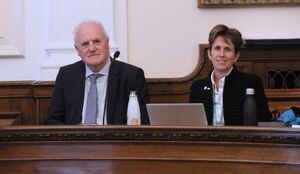Improvements for the worse?
DURING questions at the last States meeting I heard one of the most astonishing suggestions I’ve ever heard in local politics.

Someone pointed out the structure of our civil service was now markedly different to the committee system of politics that it’s there to support.
So far, so true.
But the reply suggested that we had better change our political system to make sure it aligns with the civil service.
It made me feel I had fallen down a rabbit hole into a world where everything was topsy-turvy.
Of course there is a legitimate debate to be had over what our system of government should be – more of that in a moment – but it certainly shouldn’t be driven by a need to mirror civil service reform. That goes well beyond putting the cart before the proverbial horse.
It’s more like saying ‘I need to cut off my toes because my shoes are too small’, instead of changing your shoe size.
The civil service structure has to support the political one, not the other way around.
By the way, I must confess that I’m not impressed with the impact of civil service reform so far. By that I don’t mean the drive to reduce headcount through digitisation but rather the obsessive centralisation.
In particular the loss of chief officers at the principal committees has been hugely negative. These people were not only skilled public servants, around which the departmental team could be organised and focused, but they tended to rapidly gain a degree of specialist subject knowledge too.
Removing them has emasculated committees considerably.
Then there is the idea that ‘policy work’ should be conducted by centralised ‘policy officers’, who are seconded to committees as and when needed.
There is a role for this sort of approach, because the demand for such work within committees isn’t constant.
But ideally most policies should be driven and developed from within committees’ own resources because that is where the expertise lies.
Indeed, the new approach falls into the classic trap of thinking there are ‘operational issues’ and there are ‘policy matters’ and that the two are quite separate.
Nothing could be further from the truth.

In fact it is by observing how current policies are landing on the ground that the best inspiration for improvements and new policies can be sparked.
So all civil servants should be encouraged to ‘think policy’ and the best people to advise committees on new initiatives or changes of policy are usually to be found within their own department, not in a semi-detached ‘centre’.
To paraphrase Ebenezer le Page – ‘most improvements in our civil service structure have been improvements for the worse’.
OK, let’s move on and consider the right governmental system for Guernsey.
The president and vice-president of P&R have both dropped heavy hints that they favour an executive or cabinet system of government.
I certainly don’t share that view, although I don’t deny it has some strengths.
The real question is how would it work in the Guernsey context? The best way to consider that is to look at how it works elsewhere.
In just about every country with an executive system it works like this:
After a general election you see the formation of a ‘government’.
This is a distinct entity, and a very different beast from the parliament, although to work well it will need to command regular majorities in the parliament. You can have minority governments but you really don’t want to go there.
The government is often a single party which has won a majority in the parliamentary elections.
If no party enjoys a majority then it can be a coalition of parties which between them can command parliamentary support.
Failing that either the largest party has a go at running a minority government or you have fresh elections to break the deadlock. Sometimes this requires multiple general elections in a short period.
In some ways the biggest and most crucial difference between the elections/governments in those countries with an executive system and Guernsey is that the party or parties which end up forming the government have been elected on the basis of a comprehensive, costed, scrutinised, governmental programme.
The public know what they are getting, they get the government they deserve, and that government can be held to account against the programme promised in their manifesto.
Of course, that could work in Guernsey too, but it would require some very big changes.
Firstly, the vast majority of candidates for election would need to stand on a party ticket. I think that would bring lots of down sides but that’s an argument for another day.
Secondly, those parties which do run in Guernsey elections would need to produce proper, joined-up, costed policy programmes to lay before the electorate – not the sort of vague aspirations which our two existing parties relied on at the last election.
Thirdly, the parties would need to exercise discipline over their members to make sure their programme could be delivered.
Frankly, just imposing centralised, cabinet-style control over the States while retaining the sort of elections we have now wouldn’t be executive government at all.
All it would be is a power grab by a few individuals to make sure they exercised total control over Guernsey’s elected parliament.
In the current Assembly it would put that overweening power in the hands of two members of Deputy St Pier’s ‘GPI’ party, one member of the ‘Guernsey Party’, and two deputies who stood as independents – albeit one was involved in the so-called ‘van party’.
So, a very long way from the people choosing the political programme they favour – far more a case of just the current system adapted to put all of the power in very few hands.
It seems we are going to have to have that debate sometime this term at the insistence of P&R. If it has to be, then so be it, but I sincerely hope they are roundly defeated.
In the meantime, the scandal is that they are going about acting as if they already have quasi-executive power without any such authority. I have never seen a committee quite so drunk on non-existent power.
Sadly, though, that narrative will have to wait until my next column.





